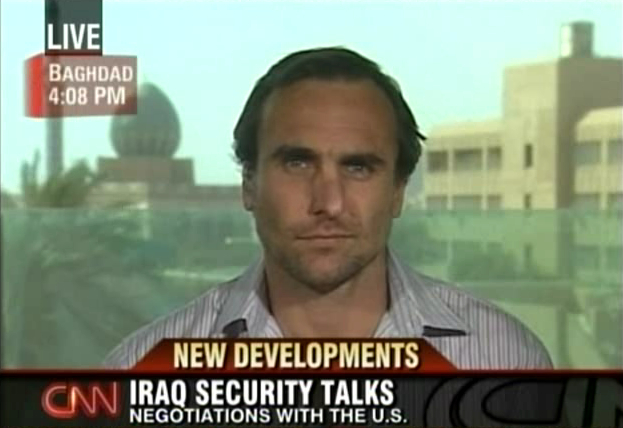NR: "It's not quite winner-takes-all high stakes poker here, but it's very close to that."

Length: 4:28
LARGE (52.0 MB) ----- SMALL (5.5 MB)
Further details on the progress of the SoFA talks: a bit of leftover law from the Bremer/CPA days may allow the Iraqi parliament to set the terms for our troops to stay in the country. You have to give them credit: they sure have learned to play Washington-style politics in a hurry! (Maybe with some help from their neighbors to the east?)
TONY HARRIS: The end game. That's right, the end game in Iraq. Is that country ready to go it alone? Just last hour we got word of a possible change in long-term security talks with the United States.
Let's get right to Baghdad now and CNN's Michael Ware.
Michael, what are you hearing?
MICHAEL WARE, CNN CORRESPONDENT: All right, Tony. This is a potentially make-or-break moment for the U.S. mission here in Iraq. And this is going to directly impact on the presidential campaign. We're going to start hearing -- needing to hear from the nominees about this.
What we're seeing is the U.N. mandate allowing for the presence of U.S. troops in this country -- allowing, authorizing the war -- is coming to an end. The clock is ticking to the end of the year.
So Washington and Baghdad are trying to come to an agreement to regulate the future presence of U.S. troops during the next presidency. However, those talks are stalled.
Iraqi prime minister came out this morning and said they're virtually in deadlock. We know from one of his aides that America this week presented a second draft of the agreement. In principle, said the Iraqis, if it's the same as the first, we're going to reject it.
What we're also hearing from the Iraqi government is that they may go it alone. Using a hangover snippet of law left over from the original American occupation authority of Paul Bremer, they could create their own legislation in their own Congress or parliament, and thereby dictate to America what U.S. troops can and cannot do in this country, where they can go, where they must stay, and how many you're allowed to have.
So you may see the Iraqis taking over this war, and you may see a lot of U.S. gains being drawn back -- Tony.
HARRIS: Michael, Michael, so let's take this apart a bit.
So there is a possibility that the Iraqis may come up with an agreement that essentially dictates terms of U.S. forces presence in the country in terms of numbers and responsibilities. Is there -- I know this is all about a negotiation, but is there anything to indicate -- well, have you heard any reaction from the David Satterfields of the world to what you're reporting now?
WARE: Well, I can't speak openly about background conversations I've had with senior U.S. officials involved in the negotiations, but I can tell you that the American negotiators do accept that this option of Iraq going it alone, passing its own laws, and essentially jamming them down the throats of the next president, is a legally viable option.
You can have an agreement within America or a country has its own right to pass its own laws about other troops in its country --
HARRIS: Michael, let me stop you there. Let me stop you there.
WARE: -- and negotiators in Washington accept that.
HARRIS: To what extent is Iran -- because we know there have been high-level visits, the highest level visits between Iran and Iraq -- to what extent is Iran dictating this new thinking by the Iraqis?
WARE: Well, put it this way, Tony: it's not quite winner-takes-all high stakes poker here, but it's very close to that. In many, many ways, the agreement that Washington can make at all with Baghdad or the legislation the Iraqis create, will tell you a lot. It will be a barometer about whether Americans' mission here, whether the Iraqi war is a victory or a defeat.
Because depending on how this plays out, we could see Iran secure the upper hand it's been trying to get with influence in this country or whether America can prevent that.
At stake is the arming, training and equipping of the Iraqi security forces. Right now America does that. The Iranians, for two years, have been saying, we're more than ready to step in and do that instead of the Americans.
The Iraqi intelligence services: one was created by the CIA, today is still run by the CIA; the Iraqis want that back and want to join it with the other intelligence agency in this country supported by Iran. What do you think that's going to do for American influence in this country and what message will it send to the region -- Tony.
HARRIS: You have given us a lot to think about, Michael Ware in Baghdad this morning for us. Michael, thank you.
